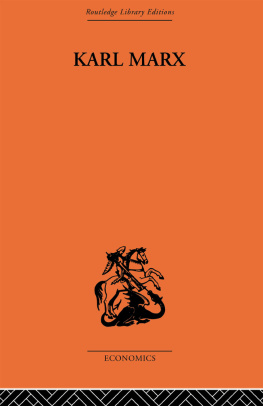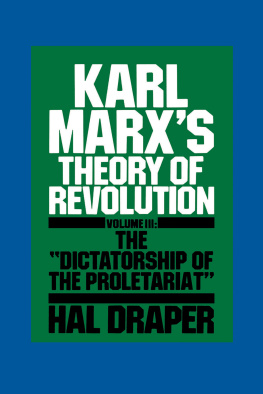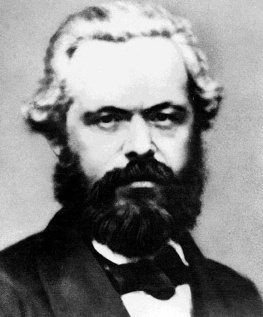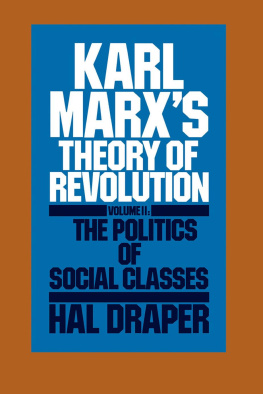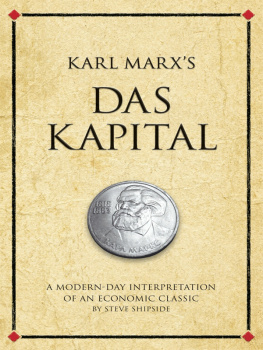
Routledge Library Editions Economics

HISTORY OF ECONOMIC THOUGHT
In 23 Volumes
I | A Select Bibliography of Modern Economic Theory | Batson |
II | Early British Economics | Beer |
III | Nassau Senior | Bowley |
IV | The Theory of Marginal Value | Birck |
V | Ricardo and the Theory of Value Distribution and Growth | Caravale & Tosato |
VI | Productive Labour and Effective Demand | Coontz |
VII | London Essays in Economics | Gregory & Dalton |
VIII | Capitalism and the Historians | Hayek |
IX | The Origins of Scientific Economics | Letwin |
X | The Individual in Society | Macfie |
XI | Essays on Hayek | Machlup |
XII | The Economics of Physiocracy | Meek |
XIII | Karl Marx | Mehring |
XIV | Marx's Critique of Political Economy I | Oakley |
XV | Marx's Critique of Political Economy II | Oakley |
XVI | J R McCulloch | O'Brien |
XVII | A Key to Ricardo | St Clair |
XVIII | Roads to Freedom | Streissler |
XIX | Economics in the Twentieth Century | Suranyi-Unger |
XX | Elements of Pure Economics | Walras |
XXI | The Common Sense of Political Economy I | Wicksteed |
XXII | The Common Sense of Political Economy II | Wicksteed |
XXIII | Social Economics | von Wieser |

First published in 1936
Reprinted in 2003 by
Routledge
2 Park Square, Milton Park, Abingdon, Oxon, OX14 4RN
or
270 Madison Avenue, New York, NY 10016
First issued in paperback 2010
Routledge is an imprint of the Taylor & Francis Group
All rights reserved. No part of this book may be reprinted or reproduced or utilized in any form or by any electronic, mechanical, or other means, now known or hereafter invented, including photocopying and recording, or in any information storage or retrieval system, without permission in writing from the publishers.
The publishers have made every effort to contact authors/copyright holders of the works reprinted in Routledge Library Editions Economics. This has not been possible in every case, however, and we would welcome correspondence from those individuals/companies we have been unable to trace.
These reprints are taken from original copies of each book. In many cases the condition of these originals is not perfect. The publisher has gone to great lengths to ensure the quality of these reprints, but wishes to point out that certain characteristics of the original copies will, of necessity, be apparent in reprints thereof.
British Library Cataloguing in Publication Data
A CIP catalogue record for this book
is available from the British Library
Karl Marx
ISBN 978-0-415-31333-9 (hbk)
ISBN 978-0-415-60726-1 (pbk)
ISBN 978-0-415-31320-9 (set)
eISBN 978-1-134-55890-2
Miniset: History of Economic Thought
Series: Routledge Library Editions Economics
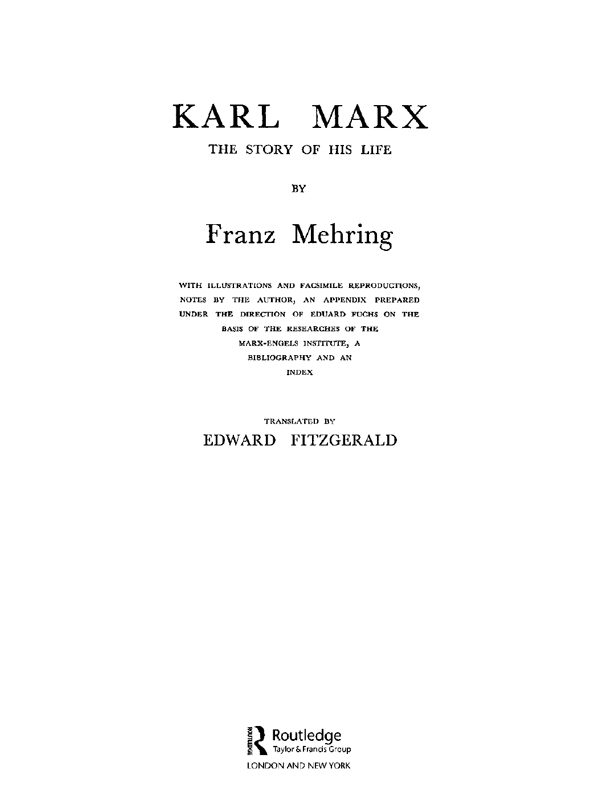
THIS BOOK IS THE AUTHORISED ENGLISH TRANSLATION OF THE GERMAN VOLUME : KARL MARX : GESCHICHTE SEINES LEBENS , BY FRANZ MEHRING
ENGLISH EDITION FIRST PUBLISHED 1936 SECOND IMPRESSION 1948

A reproduction of a little-known Marx portrait done in oils

TO CLARA ZETKIN

T HE author of this biography was born in 1846 in Pomerania of a well-to-do middle-class family. He studied at the universities of Berlin and Leipzig, taking the degree of Doctor of Philosophy at the latter. From the beginning his leanings were democratic and liberal, and when the time came for him to submit himself to the stupidities of the Prussian drill sergeant he left Prussia and went to live in Leipzig, which in those days was foreign territory . This deliberate revolt caused the breaking off of relations between him and his family. Whilst still a young man he began to take an active part in public life and in the political struggles of the day. At the age of 25 he was a member of the small band of democrats led by Guido Weiss and Johann Jacoby which had sufficient courage to protest openly against the annexation of Alsace-Lorraine by Bismarck after the Franco-Prussian War.
Mehrings chief activities were journalistic and literary, and for many years he was a contributor to prominent liberal and democratic newspapers, and later on an editor. All his life he had a keen sense of justice, and the feeling that injustice was being done was always sufficient to bring him on the scene. He defended Platen against Heine, Lassalle and Bakunin against Marx and Engels, Schweitzer against Bebel, and Bernstein against Liebknecht, and together with Rosa Luxemburg he fought a brilliant polemic against Kautsky and Riazanov. That he was not always on the side of the angels the reader of this book will discover for himself, but wherever he was to be found it was not because he had first considered the consequences to himself, but because his own sense of justice had compelled him with imperative logic.
At about the age of 30 he became a socialist of the Lassallean school, appearing in the arena with a pamphlet against the historian Treitschke. It is to this period of socialism strongly tinged with nationalism that his attacks on Social Democracy and on Marx belong. Like many another well-meaning and liberal-minded man from the ranks of the possessing classes, he approached the working-class movement equipped with democratic and liberal principles and a desire to assist the workers, and he suffered the failure and disappointment which such an approach inevitably brings with it. However, unlike many others, he did not then withdraw to nurse his wounded dignity and bemoan the proletarian lack of gratitude, but, spurred on by his initial failure, he came to grips with the problem and emerged as a Marxist.
Next page
